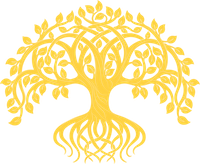As we’re in the throes of the holiday season, especially as we’re finally and fully moving out of pandemic lockdown, many of us are finding ourselves faced with some uncomfortable situations with family and/or friends and feeling increased stress, including the holiday stress that generally increases this time of year. We may also find ourselves harboring resentments toward others and/or being particularly hard on ourselves, perhaps having a hard time forgiving ourselves for things we have done over this last year that may have caused harm to others or to ourselves.
In my last blog, Focusing On The Good: Insight And Practices Into Goodness, Gratitude & A Guided Meditation, as the title suggests, I offered insight, tips and practices to help with focusing on seeing all that is good and feeling gratitude even for those people and situations that cause us strife. There is always a silver lining if we look closely enough.
Now, as we move closer and closer to the new year, I’m encouraging all of us—myself included—to skill-build by developing a forgiveness practice that entails approaching forgiveness from three directions—how we’ve treated others, how we’ve treated ourselves, and how others may have hurt or harmed us—as a way to bring more ease into these relationships and into all of our lives. With the gratitude meditation that I offered in the last blog, Encouraging Gratitude for People, Places and Things, combined with the meditation practice that I’ll offer at the close of this blog post, we can work to expand our emotional center and gain a further softening and ease both internally and within the world around us.
A Gift for the Holidays: A Holistic Forgiveness Practice & Meditation To Help Ease Suffering For All
Forgiveness is a significant topic, and something that many people struggle with—both in forgiving themselves and others. It requires introspection, compassion, empathy, and is a powerful act—a gift, really— that helps to heal both the giver and the receiver.
There are many different aspects to forgiveness. When done mindfully and with authenticity, forgiveness can open our hearts to a deeper love as individuals and, as a collective, lead to the awakening that suffering is experienced by ALL people.
With a new year approaching, I know that many people are looking to let go of resentments that feel heavy, hoping to move into 2023 with a greater sense of freedom. Through partaking in the process of letting go and healing, we can push past the struggle to accept and forgive wrongful actions that have caused us harm. We can forgive ourselves for actions we have taken that have caused harm to others or to ourselves. And, we can ask for forgiveness from the people we have caused harm to. Through the ongoing practice of forgiveness, we have the ability to improve our wellbeing, the wellbeing of the people around us, and the wellbeing of this increasingly polarized and complex world that we live in. This letting go through forgiveness and allowing for all of our humanness is quite a gift.
"How far you go in life," said the late George Washington Carver, American agricultural scientist and inventor, "depends on your being tender with the young, compassionate with the aged, sympathetic with the striving and tolerant of the weak and the strong. Because someday in life you will have been all of these."
And, so it is—for all of us!
The Benefits of A Forgiveness Practice: What I Have Learned From My Teachers
In contemplating forgiveness, I’m reminded of a powerful moment in the Mindfulness Meditation Teacher Certification Program, a two-year online training in awareness and compassion-based practices with Jack Kornfield and Tara Brach, that I completed in 2021. In one session, both Jack and Tara stood up in front of 1300 of us students on zoom and asked for our forgiveness. They spoke of how in Buddhist teachings it is a tradition to ask for forgiveness from students for how they may have failed them and for how they might have missed something that a student had wanted from them. They both expressed that they had no doubt made some errors and, for those, they were sorry. They each continued to say that they also had forgiven each of us for errors that we may have made—perhaps promises we made, such as how much we would practice, that we may have not kept. It was a very human, very moving experience—this mutuality of forgiveness, and the honoring of the human-ness of both teacher and student. I’ve never forgotten it.
The Ancient Heat of Forgiveness
I’ve learned so much from both Jack and Tara over the years, and here are some basic principles of forgiveness that I’ve paraphrased from what Jack outlines in his Greater Good Science Center lecture, The Ancient Heart of Forgiveness. I love these insights as well as the accompanying meditation practice, which are part of Buddhist psychology, and find them so helpful. I hope that you will too!
According to Jack and some wisdom from the Buddha that he offers:
Forgiveness is not agreeing, and it’s not forgetting. It’s not a minimization of the harm caused or the suffering experienced. And, it’s not something you do for the other person. Rather, forgiveness is designed to help you release yourself from the chains of continuing to hold onto a moment that has passed. As the Buddha said, “Holding onto anger is like grasping a hot coal with the intent of throwing it at someone else; you are the one who gets burned.”
The process of forgiveness helps you to understand the suffering that you are still experiencing, and that it is not compassionate for you to hold onto this suffering by continuing to feel the weight of not forgiving.
Forgiveness helps us reflect on and more deeply understand the benefits of a loving heart. Being in the NOW means being able to be released from the past and to experience the love that can happen, only if…
We stop being loyal to our suffering. As humans, we tend to be loyal to our trauma and what happened to “me.” But is that—that trauma, that hurt, that suffering—what defines you?
“Live in joy, in love, even among those who hate,” says the Buddha. “Live in joy, in health, even among the afflicted. Live in joy, in peace, even among the troubled. Look within, be still. Free from fear and attachment, know the sweet joy of the way.”
Forgiveness is a process and a practice. It’s a lifetime process that we only improve on through practice, practice, practice. Forgiveness is a training and a layering, because that is how the mind and body work and evolve.
Forgiveness takes intention. When we set our intention in any direction, it is those GPS coordinates that start the forgiveness process and keeps us pressing the accelerator, continuing to go forward in the direction we want to go toward.
When it comes to forgiving, it’s often advised to start with what’s easiest—with the smallest of infractions that you aren’t yet letting go of. Don’t start with the largest, most traumatic moments or what you feel the worst or the most guilty about. Start little by little, with small infractions.
Be willing to grieve.
Allow for time. Forgiveness can take a lot of time, practicing it over and over.
The Three Directions of Forgiveness
The meditation practice that accompanies this post involves three important aspects of/types of forgiveness. The first is the hope that those we have harmed will forgive us. The second is forgiveness of ourselves and how we are or have treated ourselves. And the third direction or dimension is forgiving others for how they treated and even harmed us.
Buddhist psychology invites us to begin with asking for forgiveness from those that we've harmed—before you move on to self-forgiveness or forgiving others—because it opens us to realize that we, too, have consciously or even unconsciously betrayed and/or harmed others. Every one of us, even those of us with the best and kindest intentions, has done something harmful to another in one way or another. When we can recognize that we, too, have created harm, it becomes possible to open not only to asking for forgiveness, but to open to extending forgiveness to those that have harmed us, including our own selves.
In the contemplation and ownership of our own actions, we become more able to understand that we are not beyond having erred in some way—that we, too, have made mistakes, have failed at things and have caused harm—to others, ourselves and perhaps even to greater humanity and the planet. This realization leads us to more easily see that, just as we have been harmful to others, so, too, others have and will harm us. This then moves us into the root of so much suffering, which is how we treat ourselves.
The Three Directions: A Forgiveness Practice Rooted in Buddhism
Part of what forgiveness allows is the ability to move on with our lives. With forgiveness, we receive the gift of not staying stuck in the awfulness of any one moment, which so many of us do. The following three-part meditative forgiveness practice is designed to help take you through the three steps of asking for forgiveness with the intent of relieving suffering for all.
This is an introductory practice that you can return to again and again. The invitation is to take this slowly and softly. Be forgiving of what you are not ready to release yourself of. And acknowledge yourself for being willing to experience the process of letting go of hurt and pain. You can also be forgiving of yourself if you are not yet ready to let go and move on. Forgiveness cannot be forced; it cannot be artificial. Simply continue the practice and let the words and images work gradually in their own way. You can access the guided meditation Encouraging Forgiveness here.
Blessings to all as we bring 2022 to a close and move forward into the new year, perhaps feeling a bit lighter and more at ease.
In peace,
Karen

